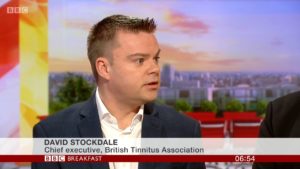Discuss on Tinnitus Talk Forum
 Tinnitus Talk spoke with David Stockdale, the chief executive of the British Tinnitus Association (BTA). We’re very excited to have David on for episode 2 of our podcast series!
Tinnitus Talk spoke with David Stockdale, the chief executive of the British Tinnitus Association (BTA). We’re very excited to have David on for episode 2 of our podcast series!
David frequently visits TinnitusTalk.com and engages with the tinnitus community through us and other channels. His dedication and drive to represent the needs of the community clearly shines through in this interview.
David talks about his drive to accomplish the BTA’s vision: “A world where no one suffers from tinnitus.” We also addressed questions like: How can tinnitus associations move the research field forward? How do they convey the tinnitus experience to the broader public? What are the pros and cons of promoting certain treatments?
Skip to: 00:00 General introduction to David Stockdale and the BTA.
Skip to: 05:10 David’s motivation.
I’d love to pack up the BTA one day and say: We’ve done it, we’ve found cures and we don’t need the BTA anymore. That’s what drives me.
Skip to: 06:56 How people with tinnitus contribute to tinnitus causes?
Skip to: 10:31 BTA’s mission and objectives.
Skip to: 15:58 Tinnitus funding, health economics, and how to move research forward.
We don’t have those [objective] measures in place that would enable the research to really jump forward.
Skip to: 22:00 BTA’s financials.
Skip to: 26:50 Challenges raising funds for tinnitus (research) causes.
Skip to: 33:33 Conveying the tinnitus experience and distinguishing levels of severity.
Tinnitus is easy to dismiss, because many people have experienced it short-term and then they associate that as being the same as what others are experiencing, which it’s not at all.
Skip to: 35:32 Prevalence and the socioeconomic cost of tinnitus.
The fact is that tinnitus costs the UK over 2 billion pounds a year; it’s huge.
Skip to: 37:25 Educating doctors to be more helpful and compassionate.
Skip to: 41:08 Representing severe tinnitus sufferers.
Skip to: 43:57 Promoting or not promoting upcoming potential treatments.
Skip to: 52:43 Promoting or not promoting currently available treatments.
We don’t promote TRT. […] My personal opinion on TRT is: the world has moved on a little bit.
Skip to: 58:30 Plans for the future.
David gives the advice to work together with one’s GP… which is of course good advice in the UK and countries in which the health care system treats tinnitus as a valid health concern. However, I presume I am not the only member of this forum who lives in a country in which tinnitus is treated by doctors, not only the GP but even otolaryngologists (ETN), as a trivial concern of the patient which does not deserve their attention.
Hello. Can you tell me if you have an organization in the United States? I live in Philadelphia, Pennsylvania. I have researched various entities that do research, clinical trials, etc. but have found only one, located in California, across the country. The other is New York Presbyterian Hospital but I don’t have the condition they are studying (pulsatile tinnitus). Thank you and best of luck with your endeavours!
In Boston, after the Boston Marathon bombing, because many people in close proximity to the bombing developed tinnitus, MIT, Harvard and Mass General Eye and Ear engaged in a study called “One Fund” which designed a computer-based program to assist in “retraining” of the brain to try to mitigate severe tinnitus. I did participate in that study. Though my tinnitus, which can be quite severe on bad days, did not disappear as a result of my participation, I was given a computer program that assisted me in being able to listen to music again (something I had to stop doing because it ramped up my tinnitus. ) This was of real importance as I am a classical musician and was unable to listen to any music. I do not know if the One Fund Tinnitus program is still functioning but it might be worth while looking into it.
First time I listened to a Podcast about tinnitus. I think this was great. I live in the United States. If you talk about tinnitus to people they don’t know what you are talking about.
I developed tinnitus as a result of cabin pressure changes on a commercial airline flight. I was recovering from a cold at the time. I temporarily lost hearing in one ear and then developed severe one-sided tinnitus. It was so severe that I found it difficult to get through the day. Sleep was interrupted constantly from the loud extremely high-pitched screeching I suffered, and from which I still suffer today.
Why has there been no push to compel the Federal Aviation Administration in the United States to issue an advisory that flying while one is suffering an upper respiratory infection can damage hearing and result in tinnitus? This seems easy enough to do and might save many people the anguish I have been through.